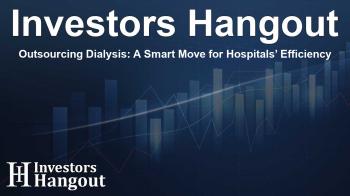Outsourcing Dialysis: A Smart Move for Hospitals’ Efficiency

Understanding the Benefits of Dialysis Outsourcing
In the ever-evolving landscape of healthcare, hospitals continuously seek innovative solutions to improve patient care while managing costs. One recent analysis of inpatient dialysis care highlights the promising potential of outsourcing these services. The report uncovers that hospitals opting for outsourced dialysis may experience significant clinical, operational, and financial advantages.
The Complexity of Inpatient Dialysis Services
Dialysis services represent one of the most demanding areas of hospital care. Patients requiring dialysis often suffer from complex conditions such as end-stage renal disease (ESRD) and acute kidney injury (AKI). It’s noteworthy that 71% of dialysis patients have ESRD only, 7% have AKI only, and 22% have both conditions, which calls for specialized care approaches.
Resource-Intensive Care
Given the intricate nature of these patients, managing inpatient dialysis can be challenging for healthcare facilities. The logistical hurdles, combined with the need for high-quality clinical interventions, mean that some hospitals may struggle to deliver optimal care efficiently. This highlights the critical consideration of whether outsourcing these services could ease the operational burden.
Evidence of Cost Savings and Improved Outcomes
In analyzing data from 349,361 patients across 546 hospitals, the findings were illuminating. The study indicated that hospitals utilizing outsourced dialysis experienced lower costs and improved patient outcomes compared to their in-house counterparts.
Comparative Costs and Length of Stay
Specifically, the analysis revealed that patients receiving in-house dialysis incurred 10% higher hospitalization costs in academic medical centers, averaging $41,853 versus $37,893. Furthermore, those requiring outsourced dialysis spent an average of 1.12 days less in intensive care in high-acuity environments and spent two fewer days in the hospital following an AKI diagnosis.
Why Outsourcing May Be the Way Forward
As the healthcare system is projected to see a rise in AKI and ESRD cases, with numbers expected to reach around 850,000 nationally, the urgency to consider alternative dialysis delivery models is stronger than ever. Experts like Emily Fitt from Sg2 have pointed out the possible long-term benefits of outsourcing, especially in academic institutions and specialized medical centers.
Efficiency in Patient Transfers
Moreover, outsourcing dialysis services could enhance transfer dynamics. By allowing lower-acuity facilities to manage more cases locally, higher-acuity hospitals can focus their resources on the most complex cases requiring intensive care, ultimately leading to a more efficient healthcare system.
Informed Decision-Making for Hospital Leaders
These findings serve as a valuable resource for hospital leaders. With the potential to improve care delivery and optimize resource utilization, the insights from Sg2 provide a foundation for collaborative discussions among clinical staff. This evidence-based approach encourages data-driven decision-making in hospitals concerning dialysis management.
Conclusion: Looking to the Future of Dialysis Services
The study emphasizes a critical point—the relationship observed between outsourcing dialysis and improved outcomes points towards a necessity for further investigation. Determining causality amid various influencing factors will be paramount in fully understanding the implications of outsourcing on patient care.
About Sg2
Sg2, a Vizient company, has positioned itself as a key partner for healthcare organizations aiming to achieve sustainable growth. Through its robust analytics and insights, Sg2 assists healthcare leaders with strategic decision-making processes that optimize patient care and financial performance.
About Vizient, Inc.
Vizient, Inc. stands as a leading force in enhancing healthcare performance across the nation. Serving a majority of acute care providers and academic medical centers, it focuses on delivering high-value care while managing substantial hospital purchasing volumes.
Frequently Asked Questions
What are the primary findings of the Sg2 analysis on dialysis outsourcing?
The analysis found that outsourcing dialysis services can lead to lower costs and shorter lengths of hospital stays, improving patient outcomes.
How does outsourcing dialysis benefit high-acuity hospitals?
Outsourcing allows high-acuity hospitals to focus on more complex cases, relieve resource pressure, and enhance operational efficiency.
What conditions drive inpatient dialysis services?
The main conditions are end-stage renal disease (ESRD) and acute kidney injury (AKI), each requiring specialized care.
Why is the analysis significant for healthcare leaders?
It provides invaluable insights that can guide collaborative decision-making and resource optimization regarding patient care delivery.
What potentially impacts the effectiveness of outsourcing dialysis?
Further research is necessary to isolate the impact of outsourcing from other variables such as patient demographics and complexity.
About The Author
Contact Dominic Sanders privately here. Or send an email with ATTN: Dominic Sanders as the subject to contact@investorshangout.com.
About Investors Hangout
Investors Hangout is a leading online stock forum for financial discussion and learning, offering a wide range of free tools and resources. It draws in traders of all levels, who exchange market knowledge, investigate trading tactics, and keep an eye on industry developments in real time. Featuring financial articles, stock message boards, quotes, charts, company profiles, and live news updates. Through cooperative learning and a wealth of informational resources, it helps users from novices creating their first portfolios to experts honing their techniques. Join Investors Hangout today: https://investorshangout.com/
The content of this article is based on factual, publicly available information and does not represent legal, financial, or investment advice. Investors Hangout does not offer financial advice, and the author is not a licensed financial advisor. Consult a qualified advisor before making any financial or investment decisions based on this article. This article should not be considered advice to purchase, sell, or hold any securities or other investments. If any of the material provided here is inaccurate, please contact us for corrections.

